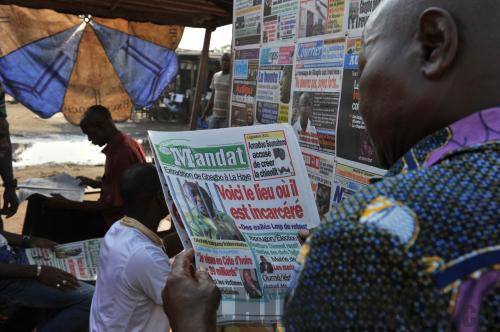|
 |
|
CAPTIVATING:A local man analyzes the latest news on Laurent Gbagbo |
On his first state visit to France at the end January, Cote d'Ivoire President Alassane Ouattara signed a new security agreement with President Nicolas Sarkozy and thanked France for their part in ousting his predecessor Laurent Gbagbo who now faces war crimes charges. "Without France, there would have been in Ivory Coast genocide worse than in Rwanda," Ouattara told French newspaper Le Monde.
After four months of devastating election violence in Cote d'Ivoire, which according to the International Crime Court (ICC) claimed at least 3,000 lives and displaced thousands, Ouattara set out to unite the nation by forming a reconciliation commission. The commission will investigate atrocities and human rights violations committed by both forces of the political divide.
The 11-member commission, chaired by the country's former Prime Minister Charles Konan Banny, and including football star Didier Drogba, is dubbed The Dialogue, Truth and Reconciliation Commission. Modeled after a similar initiative conducted in South Africa to heal the nation following the end of the oppressive system of apartheid, the process is expected to take testimony from the families of people killed by forces with loyalties to either side.
Painful past
Cote d'Ivoire's democracy was tested when Ouattara finally emerge victorious from the president elections in 2010. Gbagbo then refused to hand over power, which resulted in bloody violence claiming thousands of lives.
After many calls on Gbagbo to hand over power failed, he was pushed out with the help of the French government. Ouattara took over a polarized state.
The depth of atrocities committed during the post-election violence has left Cote d'Ivoire in tatters. According to the United Nations Operation in Cote d'Ivoire (UNOCI), the Forces Républicaines de Cote d'Ivoire (FRCI), which is the national army in the west, committed many extrajudicial killings.
A report published by UNICEF and Save the Children on November 23, 2011, cited over 1,000 violations, including 415 sexual assaults committed in Abidjan and the west since November 2010, most of them against women and girls. UNICEF representative, Hervé Ludovic de Lys said that figure was just the "tip of the iceberg," given that the vast majority of assaults were not recorded.
The international community and many international figures such as Kofi Annan and Bishop Desmond Tutu of South Africa have welcomed the formation of the reconciliation and called on the commission to address issues from both sides of the divide.
On January 18, 2012, Annan met President Ouattara, Prime Minister Guillaume Soro and Charles Konan Banny, Chairman of the National Commission for Dialogue, Truth and Reconciliation. He also met Bert Koenders, the Special Representative of the UN Secretary General and head of UNOCI, the UN peacekeeping operation in Cote d'Ivoire and emphasized that "the task of reconciliation and healing must remain a national priority to help overcome the legacy of the past."
Annan said he was pleased with the constructive discussion he had with the chairman and members of the reconciliation commission, but he cautioned the commission to be circumspect since the venture is a complex one.
"This is a complex undertaking, which must be planned and led by the national authorities with the support of the international community. Experience shows that this task cannot be postponed. Security and stability go hand in hand with economic development," said Annan.
|